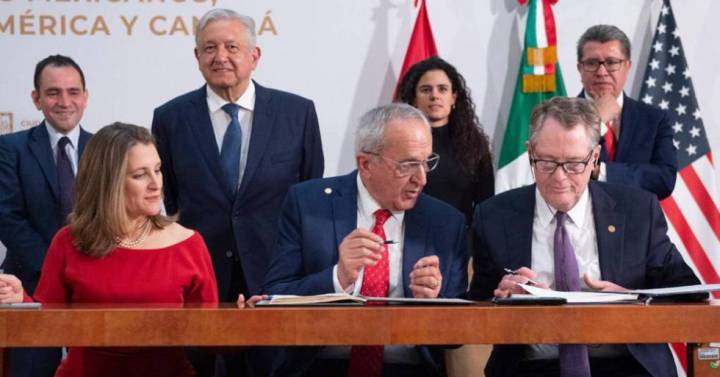The path towards the adoption of the Treaty between Mexico, the United States and Canada (T-MEC) in the three countries has been difficult but, with the approval of the agreement in the House of Commons, the Senate and the signature of the Governor General of Canada completes a long process that will be key to the future of Mexico and the region. The result of this complex negotiation contributes to dispel the uncertainty that weighed on the economic actors in the three countries and provides more tools to face the current adverse global economic outlook.
The success of ratifying the agreement has not been fully explained. The T-MEC represents a particularly outstanding negotiation because it has brought opposing parties to agreement: the different union bodies and business leaders from three major economies worldwide have reached common ground. With the T-MEC signed and ratified in the three countries, we will be able to focus our efforts on addressing other priority issues such as addressing the current situation of global financial volatility.
The approval of the T-MEC records a conclusion that seemed to be in doubt: North America, as a region, is moving towards a closer cooperation scheme. Mexico, the United States and Canada are united through trade and investment. Just look at the numbers: out of every hundred pesos that Mexico exports, forty come from US value chains and twenty-five from Canada. In reality, Mexican exports are inherently North American.
But, beyond the economic stability offered by the T-MEC, the new agreement has social implications both in the workplace and in the environment. The treaty includes regionally thought-out environmental regulations, as well as shared labor regulations and a new dispute resolution instrument. In addition, the T-MEC strengthens the North American Development Bank, which will imply more funds to invest in the border area between Mexico and the United States. The deep meaning of the T-MEC goes beyond dispensing with tariff tariffs as it has expanded the areas in which, in a coordinated manner, Mexico, the United States and Canada coexist. It is the next historical step to impose on our shared geography a common institutional scheme.
The North American Free Trade Agreement (NAFTA) that laid the foundations of a North American economic network a quarter of a century ago had a cost for Mexico. NAFTA established the role of our country as a source of cheap labor. For more than twenty-five years, the flow of trade depended on Mexican wages being significantly lower than in the United States and Canada. We built value chains that strongly united the three countries but also deepened economic inequality in Mexico.
The T-MEC is a progressive instrument that opens the way for a profound change in the economic development of Mexico. Our economy has the maturity necessary to move towards a scheme in which our comparative advantage is not low wages. The T-MEC represents the commitment to the wealth of our human capital, the talent of our entrepreneurs, a vibrant internal market and the role of innovation, all with the protection of higher wages.
In addition, the new agreement is also important to other business partners outside of North America because it places the right incentives to attract even more foreign investment to our country. The North American market represents around 28% of world GDP and is highly attractive to the rest of the world. Those business partners outside North America who want to access this market will find that the best option is to invest in Mexico to sell from here. In this sense, the ratification of the T-MEC is not only a North American message but one of global significance.
The T-MEC arrives to deepen collaboration and deepen ties between Mexico, the United States and Canada. The treaty is a reflection of a negotiation that, in difficult times for the system of international rules and for the global economy, shows Mexico for what it is: a democracy whose foreign policy achieves global agreements. However, this time, the difference is clear: we are focused on economic development but also on a more equal distribution of the benefits generated by the T-MEC in Mexico.
Roberto Velasco Álvarez is a spokesperson for the Ministry of Foreign Affairs of Mexico.
You can follow EL PAÍS Opinion on Facebook, Twitter or subscribe here to the Newsletter.








